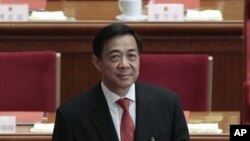Chinese political analysts are weighing the implications of the public fall of ambitious political leader Bo Xilai, who was recently dismissed as Communist Party chief in China's sprawling southwestern megacity, Chongqing.
Much of the attention is focused on a confidential report that appears to provide new details of Bo's undoing. It says the central government decided to fire Bo after he interfered with a corruption investigation targeting his family and demoted one of his closest aides without first securing approval through normal Communist Party channels.
Circulated among high-ranking party members last Friday, the report was leaked on the Internet and confirmed with party sources by foreign media. It sheds light on one of the biggest public scandals to hit the world of Chinese politics.
The document confirms widespread speculation that Bo's police chief and trusted aide, Wang Lijun, visited the U.S. consulate in Chengdu last month to seek asylum.
The report says Wang made the move out of fear for his safety. It says Bo had demoted him from his police post just days after Wang came to him with news of a criminal investigation involving members of Bo’s family.
“Was the final objective of that investigation to get rid of him [Bo Xilai]?” asks Jean Pierre Cabestan, professor of politics at Hong Kong Baptist University. “I would say probably.”
Bo, the son of one of the Communist Party's "founding fathers," was already a member of the Politburo, the highest echelon of political power in China. He aspired to be named to the Standing Committee, the innermost circle within the Politburo, when new members are appointed during the 18th Communist Party Congress later this year.
But political analysts believe Bo's populist governing style, which featured a return to leftist economic policies of the past, had set him apart from the relatively reform-minded party leaders who are expected to assume power in the coming months.
When in charge of the huge metropolis of Chongqing, Bo launched a number of eye-catching campaigns, including police operations managed by Wang against the city’s well established organized crime leaders. He also won the hearts of China's neo-conservatives by promoting a nostalgic revival of Maoist ideology and songs.
That appears to have set off alarms in Beijing. Casteban, the Hong Kong based professor, says recent statements by Premier Wen Jiabao about the need for political reform were meant as a warning to others in the party who admired Bo's approach.
“To what extent this will be echoed by the party leadership and [by] a platform approved by the 18th Party Congress remains to be seen,” says Cabestan. He said Xi Jinping, who is expected to succeed Hu Jintao as president next year, "is very much in the middle of the road. He has kept his cards close to his chest; I don't see him embarking on a destabilizing and varying political reform program.”
Both Xi Jinping and Li Keqiang, who is expected to replace Wen Jiabao as premier, will hold seats on the Politburo’s new Standing Committee. But the remaining seven seats are up for grabs.
Wang Yang, party chief of the rich southern province of Guangdong, is thought to be a candidate for the seat that would have gone to Bo. His “Guangdong model,” which favors private enterprise and encourages the work of civil organizations, stands in stark opposition to Bo’s support for state-owned enterprises and top-down governance.
Renmin University professor and political commentator Zhang Ming says that with his “Chongqing model,” Bo showed it is possible to get things done without necessarily taking the path of political reform.
“The fact that he was dismissed, and won’t get into the Standing Committee, shows that China has avoided a turn to the left,” Zhang says. “But it is very unclear to say in concrete who will benefit from his downfall.”
News
New Details on China’s Sacking of Top Party Official




